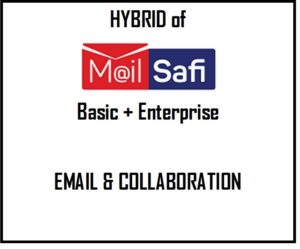The short answer is, it’s not the greatest idea for your business.
Is losing access to your business email for an extended period of time not just an inconvenience, but a real dumper, a show-stopper? If so, you may want to read this!
When you are trying to set up a business website and start looking for a hosting solution, you invariably come across great-looking shared hosting plans. The quality of service you get with shared hosting varies with the provider/plan chosen, however, we can make some generalizations.
At first glance, these plans look feature-rich and cheap. It becomes extremely tempting to buy into shared hosting, not just for your website but also for your email. And you know what? You may eventually give in to that temptation. But sooner rather than later, you realize something is just not right. Your email slows down for no reason. Things stop working without a warning :-(((
So Why is Hosting Your Email on Shared Hosting Platform a Bad Idea?
Let’s look at a few reasons why hosting your critical business email in one of these shared platforms is a terrible idea and why organizations that rely heavily on email for their daily operations should stay away from it, even though other options are a bit more expensive. Before we get there, let’s agree on what shared hosting really is.
What is Shared Hosting?
As the name implies, shared hosting allows multiple businesses or individuals to host their websites on a single server. Usually, you will have no idea who or what websites you are sharing a server’s resources with. Each client will usually have a limit on the amount of server resources they can use. Your hosting package will define this limit.
Over time, however, some businesses have also extended these shared platforms to host their emails. Those who do automatically acquire a mail server often with no experience or expertise to manage one. This lack of expertise in email hosting is more often than not a recipe for disaster because effectively, the same server resources (processor, RAM, storage and disk space, network bandwidth) are shared with other “neighbors” who would be unknown to you.
Your emails could be on the same server with hundreds (or thousands!) of other companies’ or individuals’ websites or emails, all fighting for the same set of resources.
Let that sink in for a minute.
So Why is Shared Hosting So Popular?
The main reason why most businesses end up with shared hosting is the low cost associated with it. Because multiple websites/emails are hosted on a single server, the costs are distributed. A basic shared hosting package could start at just a couple of dollars a month, making getting started on shared hosting quick, easy, and cheap. While shared hosting may not be a terrible idea for small businesses just starting, in the long run, many quickly discover that it more drawbacks than merits.
The security risks of hosting your email on shared hosting platforms come from its sharing basis.
Why Hosting Your Email on a Shared Hosting Server is Not a Great Idea
Let’s walk through the reasons why we recommend businesses stay away from shared hosting for their emails.
1) Bad support – those hosting your emails are not experts in email management
If email is a lifeline for your business, do not give in to the temptation of shared hosting.
It’s like hiring the wrong person for a job.
When I need a swanky haircut, I go to my barber. When I need my hedges trimmed, I call up my gardener. Both are great with a pair of shears, but I can tell you, I don’t want my gardener cutting my hair!
Likewise, I want the person hosting my email to eat, drink, and sleep email. I want them focused on being the best freaking email host they can be. I don’t want them halfheartedly taking care of my email because they gave me a share of their server for pennies.
Even though shared hosting companies claim to provide support, the support itself might not be skilled. The concept of shared hosting focuses on splitting servers for use by many. Their competence is certainly not email.
Example:
If your email goes down, they will most likely just restart it for you. If you ask why it keeps going down, they may hazard a guess or be clueless because they are just a reseller of hosting services for websites. Most often, they will not go to great lengths to figure out what the problem is.
In general, you will soon realize you are not talking to someone who understands email, but rather one who expects you to solve your own email problems. For major issues, you will have to seek expert help from outside. This begins a spiral of unpredictable costs to keep your business emails up and running. This sheer lack of good support is a big limitation of shared hosting.
Look, I know we’re all looking for a good deal and may prefer to get the cheapest option, but I can’t say this enough:
Let everyone play to their strengths, including whoever is hosting your email.
The majority of shared hosting providers have nowhere near the expertise in hosting emails as do third-party email providers.
2) Having trouble with your email? You’re on your own!
When you get space to host your website/emails on these shared hosting servers, you are responsible for running your own space and what you keep in there. The service provider’s work is only to ensure the server is up and you have access to the resources you paid for. Beyond that, you are literally on your own.
You will soon discover that a high degree of expertise is required to manage email to ensure continuous availability and eliminate threats to your business. This includes 24*7 monitoring, keeping out the spam, viruses, malware, hackers, monitoring tools for uptime, preventing email spoofing, reducing phishing risks, and so on. It is not an easy task to have your email flowing flawlessly round-the-clock!
3) High risk of being blacklisted leading to email bouncing
To stay competitive, many service providers offer web hosting packages for dirt cheap, sometimes even free, and that includes email hosting. This is great news for the spammers because it means they can also simply masquerade as persons interested in hosting their websites/emails on the shared server. However, after subscribing, they quickly send out multiple unsolicited emails or viruses from these servers.
Shared hosting is a spammers haven!
So what does that have to do with me? Well, everything! By virtue of the fact that your emails are hosted on a shared server, you will run into problems if any other site is involved in bad practice such as sending spam emails or hosting illegal content.
When spam, viruses, or malware “bad emails” start getting sent out, the shared hosting server’s IP address begins to get placed on blacklists. These are often referred to as RBLs (Real-time Blackhole List). If your business email is hosted on a server flagged as coming from a “bad” IP, it will be bounced back from whatever company has it on the blacklist.
The unfortunate thing about this scenario is that it may not be because the spam, virus, or malware originated from your users. Rather it could be from any of the other clients’ websites/emails hosted on the same shared server. Therefore, even if you submit a delisting request, you may soon be blacklisted again if “your neighbors” (aka other clients on the same platform) continue sending spam.
4) If one goes down, it all goes down
This probably is one of the biggest downsides of shared hosting and another major reason why as an option for business email, you should not touch it with a ten-foot pole!
The mere fact that shared hosting providers usually put hundreds or even thousands of websites on the same shared server increases the chances of being hacked.
Shared hosting is a magnet for hackers!
Even if your website is up to date and secure, others hosted on the same server might run outdated software, increasing their vulnerability to hackers/exploits. Should one of the websites on the shared server be hacked, there is a high probability that your emails will be affected as well. In this situation, security measures applied to your own website might not be enough to protect it or your emails against hackers. A hacker can easily access your sensitive business email as soon as they gain access to the shared server owing to the “insecurities of your neighbor.”
And if the server itself gets hacked and crashes, your email goes down with it. Basically, with no wrongdoing on your part, your critical business email comes under potential threat in a shared hosting environment.
5) Poor performance or sluggishness
In addition to security risks, a shared hosting service may also affect your email accessibility. This is because it has to compete with other websites over the same resources.
“Bad neighbors make your emails take F.O.R.E.V.E.R to download!”
Many business owners with their emails on shared platforms complain that their emails are often very slow to download. Ordinarily, if one or more websites on a shared server get good traffic or experience a spike in traffic, the entire server could slow down considerably. Resources become stretched during these intervals leading to degraded performance overall on the server. This, in turn, could slow down your email access.
Likewise, if you are actually that “bad neighbor” who is using up a lot of resources because your website is receiving very high traffic, or you are constantly getting a ton of bulky email, downloading your emails from the server will become sluggish. Now, consider the irony. You created your website in anticipation that it gains popularity, but when it actually does, it becomes a problem!
6) Limited Unlimited
If you are already hosting your emails in a shared environment, you may have already realized that the resources offered to you are more limited than you imagined when you signed up for the service. Shared hosting companies are notorious for advertising “unlimited everything”: unlimited storage, unlimited emails, unlimited bandwidths, etc. However, soon you realize that there is nothing unlimited.
The truth is, if you look at the fine print (terms and conditions), you will notice that these restrictions have been spelled out in most contractual agreements. In an effort to fight back spammers and hackers, shared hosting providers have implemented stricter email policies, better fraud checks, and severely limit the number of outbound emails that can be sent per user on shared hosting.
As your email accounts start gathering a lot of emails, the space becomes restricted. Also, if there’s too much email to be delivered to your domain on any one day and your allotted limit is reached, you will not be able to receive any more emails as you will be deemed to be consuming excessive bandwidth to the detriment of other users. You will have to wait perhaps a few hours or until the next day until you can get any more emails coming through to you.
Shared hosting has really nothing unlimited. It is just deceptive advertising!
7) It’s like having all your eggs in one basket
Just as it isn’t a wise idea to have all your financial investments in one basket, it’s best not to do this with your email. Especially as your business grows, your email will become part of your daily routine; if it isn’t already. If something happens with your web server, your email could also be affected. Hosting your email onto a different server will spare you the pain of having no email for hours should your web server go down.
8) You Cannot Access Your Email on Multiple Devices
A long time ago, it was okay to use a POP3 email account that comes with your web hosting. POP3 is a one-way technology. We were used to having a single computer and all of our emails were sent to that one computer.
However, with growing mobile technology reliance even in business (smartphones, laptops, tablets, iPads), we can and do access our email from many different platforms. Having your email synced using cloud email and collaboration solutions helps your workflow as you can access your emails on multiple devices, anytime and anywhere.
So What is the Solution?
The best way to eliminate these problems is by choosing a third-party email provider for your email hosting.
Unlike in shared hosting, third party/cloud hosting email providers are experts in email management. Because email is their core business, they are quick to detect and shut down any threats on their servers before you even report it.
Reputable third-party email providers usually invest in systems to monitor their servers every second of the day. These service providers can detect and anticipate potential points of failure (such as memory running low, hard disk getting full) and deal with them before they affect your email delivery. Because of their swift response, most times, you may never even notice there was ever a problem.
Additionally, unlike shared hosting providers who have your email only on one server, third-party email providers have multiple servers for redundancy. Your emails are backed up in separate servers to build redundancy.
Having access to multiple servers is advantageous because if one server has an issue, your emails can simply be migrated to another one and your email flow continues uninterrupted. This failover technology ensures your email is still accessible while it’s being rebuilt on other servers. In short, third-party email hosting is comparatively more reliable making it a better choice for organizations for which email downtime or loss of email would be detrimental to business operations.
Hosting your email separately with a third-party provider will typically give you more storage space than in a shared hosting environment (sometimes up to 30 GB or more), and this storage space is scalable. It depends on the email service provider. They also often have better calendar and address book features that allow for customized group or global sharing.
See other reasons why it’s a smart idea to let a third-party email provider manage your business email. Contact us to discuss how we can help!
![]()





Pingback: Cloud Email Hosting or On-premise Mail Servers? » The MailSafi Blog